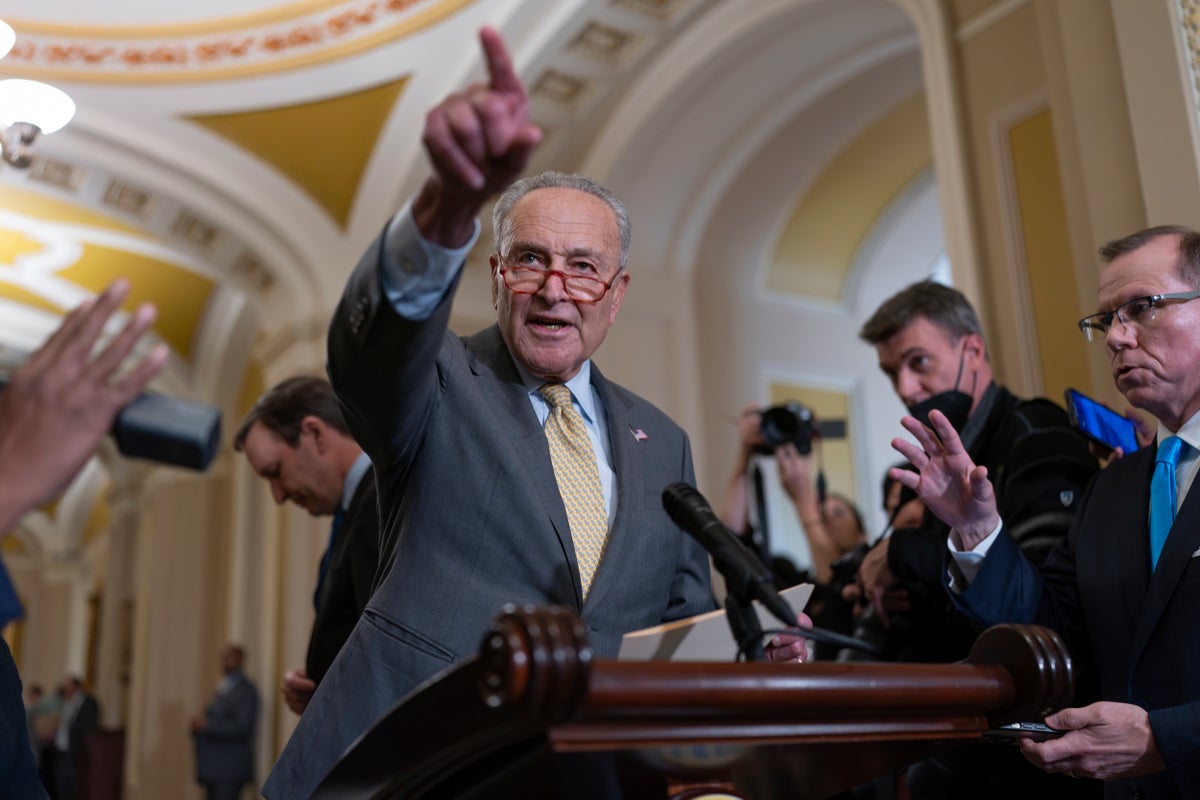
Senators representing the Republican and Democratic parties have agreed to advance a compromise measure that would prevent the government from running out of funds on Saturday by continuing operations at current levels for the next month and a half, Majority Leader Chuck Schumer said on Tuesday.
Mr Schumer said the Senate would take the first procedural vote on moving the legislation, known as a continuing resolution, through the upper chamber later on Tuesday evening. That vote, which began shortly before 6pm ET, saw 77 senators vote to open debate on the compromise bill — 17 more than would be required to defeat any fillibuster of the legislation.
The New York Democrat described the agreement as one that would “continue to fund the government at present levels while maintaining our commitment to Ukraine’s security and humanitarian needs while also ensuring those impacted by disasters across the country begin to get the resources they need”.
The Senate’s impending votes on the compromise bill come as the Republican-controlled House, led by Speaker Kevin McCarthy, continues to struggle with basic tasks of legislation despite the fast-approaching end of the US government’s fiscal year.
If the House and Senate do not pass any measure to fund the government and send it to President Joe Biden’s desk by midnight on 30 October, millions of federal workers will be furloughed and vital government programmes will be forced to cease operations, while many military and law enforcement personnel will be made work without pay.
A small number of House Republicans have refused to vote for any bill to fund the government that does not extract draconian cuts in a broad swath of federal programmes, zero out all funding for Ukraine’s defence against Russia, and specifically defund investigations and prosecutions of former president Donald Trump. Still others are refusing to vote for any short-term funding measure at all, instead claiming that anything short of a full budget package is a dereliction of duty.
But funding legislation that matches the far-right extremist wish list has zero chance of becoming law because it would not be able to pass the Democratic-controlled Senate or gain the assent of Mr Biden.
Mr McCarthy, who has largely assented to the demands of his conference’s right-most flank since becoming Speaker in January, has scoffed that the idea that the Senate would be able to agree on legislation before his chamber is able to act.
While speaking to reporters on Tuesday morning, he refused to entertain what he described as “hypotheticals” when asked repeatedly whether the House would consider any legislation passed by the Senate.
He continued to refuse such questions when he held another impromptu news conference later in the day.
“I heard all this time, they’re going to pass appropriations bills all month,” Mr. McCarthy said. “Remember, you all wrote about it? They were the good chamber. So when they pass something, come back and ask.”
A decision by the California Republican to allow his chamber to take up any Senate-passed bill — or any move to allow a bill supported by the House’s Democratic Caucus to pass through the chamber — would likely cause some of the extremists to whom Mr McCarthy owes his current post to formally call for his removal.
But one GOP senator who supports the compromise measure, Senator Chuck Grassley of Iowa, told The Independent that ensuring continued funding for the government is the Congress’ only function right now.
“This week we only have one thing we have to do: make sure government doesn’t get shut down,” he said.
Senator Elizabeth Warren, a Massachusetts Democrat, told The Independent that the upper chamber “can keep the government open” by enacting the bipartisan bill senators were poised to advance after voting to open debate on the measure on Tuesday evening.
“The question is whether Speaker McCarthy has enough spine to bring a Senate bill to the floor of the House and get it done,” she said.
That remains unclear. But after a weekend of negotiations, the speaker remains no closer to any legislation that could pass the House and keep the government open. His opponents in the holdout contingent, led by Rep Matt Gaetz, show no sign of relenting and accepting Mr McCarthy’s offer.
But in a statement, White House Press Secretary Karine Jean-Pierre expressed hope that the Senate’s legislative solution could yet head off a lapse in government funding.
Ms Jean-Pierre praised the bipartisan bill as one that “will keep the government open, make a down payment on disaster relief, and is an important show of support for Ukraine”.
“House Republicans should join the Senate in doing their job, stop playing political games with peoples’ lives, and abide by the bipartisan deal two-thirds of them voted for in May.,” she said.







